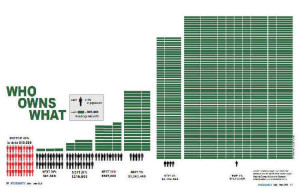Note: This is a follow up to my previous post on “universal inheritance.”

I’m not a complete idiot, so I know that politics in the United States would not favor a universal inheritance at this time, for a variety of practical and ideological reasons.
Yet pursuing the thought experiment to the point of figuring out how this could ever pass is the least I could do for such an intriguing idea.
The universal inheritance, in Atkinson’s proposal, would be funded by proceeds of an estate tax. That’s never going to work.
While that funding source has a certain pro-equality appeal, it also conflates an idea that could stand on its own merits (universal inheritance) with a political landmine, the estate tax (aka Death Tax). While I’m pretty pro-Death Tax myself, at least in the United States (and I imagine in the Atkinson’s UK as well), one should pick one’s battles carefully.
The estate tax in the United States currently raises approximately $9 billion in revenue. Upping the rate or lowering the estate tax threshold so that it fully funds what I imagine to be a $35 billion cost could represent a challenge.
When I think about the political challenges of advocating for a transfer payment like ‘universal inheritance,’ I think of another transfer payment that actually got passed.
In 2015, we don’t (well, most of us don’t) have that grumbly feeling about retirees receiving Social Security. Those payments now seem somehow ‘fair,’ although a quick scan of history tells us Social Security appeared to some as competition- and business-destroying and when first introduced in 1935. So our notion of what’s fair can shift over the years.
So if I love the idea so much, how would I make this happen?
Here’s how to do it: We link the $8,100 universal inheritance for 18 year olds to Selective Service Registration, which is still a requirement for males, even without the military draft. We make selective service a requirement for women as well as men (obviously), making all eighteen year olds eligible for their universal inheritance.
If you really want to make this universal inheritance a reality, appealing to the broadest political spectrum in the US, then the $8,100 payment gets made contingent upon the completion of compulsory National Service. Compulsory service would be military in some cases, although we can imagine a wider variety of service employment for young people.
My sense is military folks are not eager for the re-introduction of a compulsory universal draft, so it probably suits the national good to have both military and non-military compulsory service.
Anyway, that’s my brief thought experiment on universal inheritance, and how to make it politically palatable.
See related posts on inequality:
Kooky and Good Idea: Universal Inheritance
Washington Post interactive inequality map
Post read (637) times.




